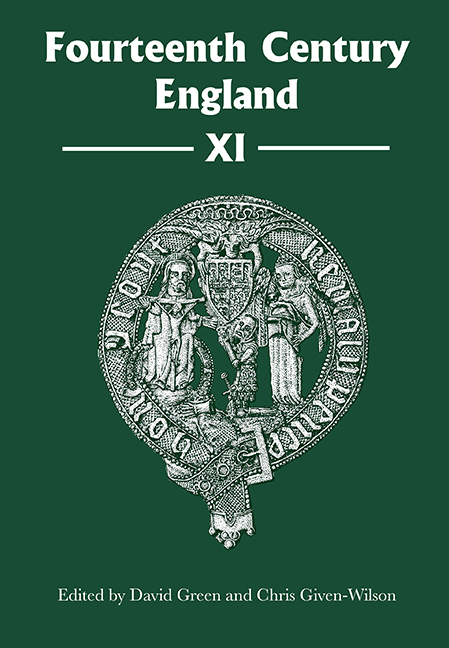Book contents
- Frontmatter
- Contents
- List of Illustrations
- List of Contributors
- Preface
- Abbreviations
- The Evolution of Edward I's ‘Historical’ Claim to Overlordship of Scotland, 1291–1301
- Prelates and Political Reform: The Bishops and the Ordinances of 1311
- Sir Robert de Wateville (d. 1330) of Essex and the Younger Despenser, 1322–6
- Memory, Genealogy and Nationality in Plantagenet England: The Plugenet and Walerand Estates, 1265–1368
- The ‘Apparitional’ Magna Carta in the Long Fourteenth Century
- Family, Loyalty and the Royal Household in Fourteenth-Century England
- The Revolution Stops Here? Leicestershire and the Rebellion of 1381
- FOURTEENTH CENTURY ENGLAND ISSN 1471–3020
Memory, Genealogy and Nationality in Plantagenet England: The Plugenet and Walerand Estates, 1265–1368
Published online by Cambridge University Press: 14 September 2019
- Frontmatter
- Contents
- List of Illustrations
- List of Contributors
- Preface
- Abbreviations
- The Evolution of Edward I's ‘Historical’ Claim to Overlordship of Scotland, 1291–1301
- Prelates and Political Reform: The Bishops and the Ordinances of 1311
- Sir Robert de Wateville (d. 1330) of Essex and the Younger Despenser, 1322–6
- Memory, Genealogy and Nationality in Plantagenet England: The Plugenet and Walerand Estates, 1265–1368
- The ‘Apparitional’ Magna Carta in the Long Fourteenth Century
- Family, Loyalty and the Royal Household in Fourteenth-Century England
- The Revolution Stops Here? Leicestershire and the Rebellion of 1381
- FOURTEENTH CENTURY ENGLAND ISSN 1471–3020
Summary
Introduction: Family, land and inheritance
Families tell lies. Medieval English society, at many different levels, had a keen sense of the importance of dynastic history, since it was on the basis of understandings about lineage that many of the key issues about property and rights were determined. Yet when the transmission of tenure or other rights was particularly complicated and became a matter of dispute, the sorts of written evidence taken for granted today were virtually unknown. Substantial landed families who kept archives of estate records, charters and even basic genealogies found that such material was often of little use in resolving complex disputes that included players in relatively distant collateral branches beyond the immediate line of descent in the senior line. The unexpected extinction of a family also left other dynasties with the challenge of reclaiming the history of a title in order to support claims to the inheritance rights of their wives, mothers or grandmothers. Under such circumstances, the limitations of the written record and the necessary resort to memory could result in highly subjective statements about the past and the construction of sometimes wildly different stories told by rival factions within a family about the supposed rightful line of descent.
For those who held some or all of their land in chief of the Crown, these disputes were played out principally at the inquisitions post mortem held by the royal escheators in each county where a deceased person had property, and whose evidence was required before the agreed heir could take posses-sion. As in so many other cases before the courts in later medieval England, the juries in these inquests could be subject to the abuse known generically as ‘maintenance’: the bringing of untoward pressure by rival parties wishing to influence the outcome of the process. In some inquisitions post mortem, indeed, the whole process was clearly something of a fait accompli: with or without the collusion of the escheator, a claimant with sufficient clout in the local area might effectively nominate the jurors themselves and simply have them ‘rubber stamp’ their own decidedly partial account of their right to the inheritance. In other instances, jurors might disagree among themselves or, when multiple juries were called upon the same case, could return strikingly different evidence as to the existence of heirs.
- Type
- Chapter
- Information
- Fourteenth Century England XI , pp. 77 - 108Publisher: Boydell & BrewerPrint publication year: 2019
- 1
- Cited by



